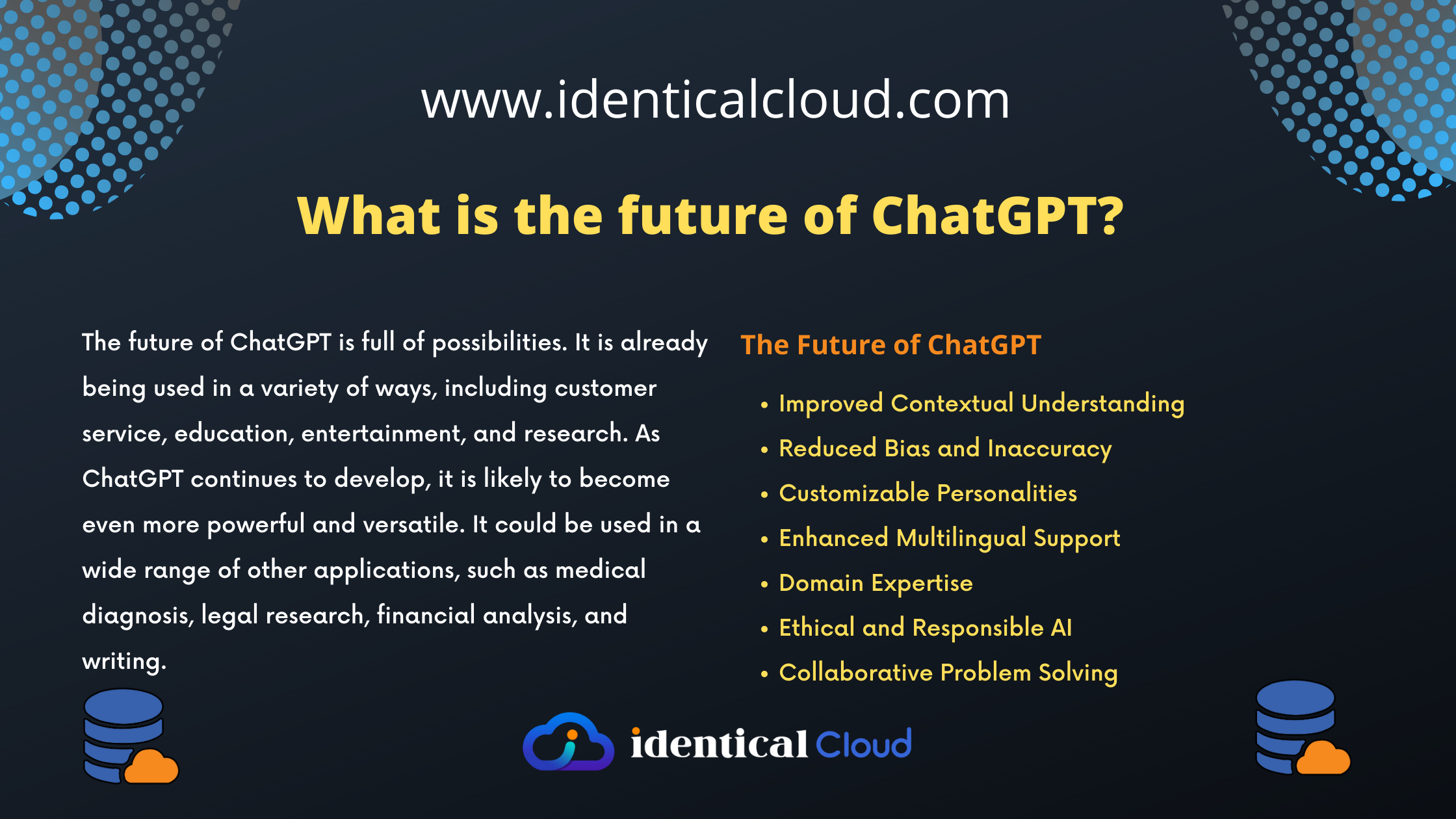
What is the future of ChatGPT?
What is the future of ChatGPT?
In the rapidly evolving landscape of artificial intelligence and natural language processing, one remarkable innovation that has captured the imagination of many is ChatGPT. Developed by OpenAI, ChatGPT represents a significant leap forward in human-computer interaction, showcasing the potential of AI-powered conversational agents. As we delve into the intriguing world of ChatGPT, it becomes evident that its future holds tremendous promise and potential to reshape how we communicate with machines.
The future of ChatGPT is full of possibilities. It is already being used in a variety of ways, including customer service, education, entertainment, and research. As ChatGPT continues to develop, it is likely to become even more powerful and versatile. It could be used in a wide range of other applications, such as medical diagnosis, legal research, financial analysis, and writing.
What is ChatGPT?
ChatGPT is a large language model chatbot developed by OpenAI. It can generate text, translate languages, write different kinds of creative content, and answer your questions in an informative way. ChatGPT is still under development, but it has learned to perform many kinds of tasks.
Understanding ChatGPT:
ChatGPT is an advanced language model that uses a variant of the GPT (Generative Pre-trained Transformer) architecture. The model is pre-trained on a massive corpus of text data to understand grammar, context, and even nuances of language. It excels in generating human-like text, making it well-suited for tasks that involve generating conversational responses. Its ability to comprehend prompts and produce coherent and contextually relevant replies is what makes ChatGPT truly remarkable.
Evolution of ChatGPT:
Since its inception, ChatGPT has undergone several iterations, each demonstrating improvements over its predecessor. The development of ChatGPT models involves two main phases: pre-training and fine-tuning. In the pre-training phase, the model learns from a wide range of text sources, acquiring language skills and world knowledge. Fine-tuning follows, where the model is refined on specific tasks using human feedback. OpenAI has released various versions of ChatGPT, each with enhanced capabilities and reduced instances of generating incorrect or biased content.
The Current Capabilities:
As of my last knowledge update in September 2021, ChatGPT was already impressively skilled at engaging in conversations on diverse topics. It could answer questions, provide explanations, offer creative ideas, and even simulate personalities to some extent. However, it was not without limitations. It occasionally produced responses that were factually inaccurate, contextually inappropriate, or politically biased. It struggled with maintaining consistent context over longer conversations and often provided verbose answers.
The Future of ChatGPT
Looking ahead, the future of ChatGPT holds exciting possibilities for addressing its current limitations and expanding its capabilities:
1. Improved Contextual Understanding:
Future iterations of ChatGPT are likely to exhibit a deeper understanding of context, enabling more coherent and contextually relevant responses in extended conversations. This could involve the model keeping track of ongoing topics and references, leading to more natural interactions.
2. Reduced Bias and Inaccuracy:
Efforts to mitigate biases and inaccuracies in AI-generated content will likely play a significant role. By refining the fine-tuning process, incorporating more diverse training data, and implementing stricter content guidelines, ChatGPT could become a more reliable source of information and ideas.
3. Customizable Personalities:
The ability to customize ChatGPT’s personality or style of interaction could be an exciting feature. Users might be able to specify whether they want responses to be formal or casual, enthusiastic or reserved, aligning the AI’s behavior more closely with their preferences.
4. Enhanced Multilingual Support:
Future versions could excel in multiple languages, not just English. This would open the door to more inclusive and globally accessible AI interactions, catering to a diverse range of users worldwide.
5. Domain Expertise:
Specialized versions of ChatGPT tailored to specific domains could emerge. These models could provide expert-level insights and responses in fields such as medicine, law, technology, and more.
6. Ethical and Responsible AI:
The future of ChatGPT also involves addressing ethical concerns. Stricter content moderation, transparency about the AI’s nature, and clear labeling of AI-generated content could help users differentiate between human and AI-generated information.
7. Collaborative Problem Solving:
Imagine ChatGPT evolving into a collaborative problem-solving partner. It could brainstorm ideas, propose solutions, and aid users in tasks that require creative thinking.
Challenges and Opportunities
There are a few challenges that ChatGPT will need to overcome in order to reach its full potential. One challenge is that ChatGPT is still under development and can sometimes make mistakes. For example, it may generate text that is grammatically incorrect or factually inaccurate. Another challenge is that ChatGPT can be biased, reflecting the biases of the data it is trained on. This could lead to problems if ChatGPT is used in applications where accuracy and fairness are important.
Despite these challenges, ChatGPT has the potential to be a powerful tool that can improve our lives in many ways. It is important to be aware of the challenges so that we can develop strategies to mitigate them. With careful development and use, ChatGPT can be a force for good in the world.
The journey ahead involves a delicate balance between pushing the boundaries of AI capabilities and upholding the principles of transparency, accountability, and user safety. With each iteration, ChatGPT inches closer to becoming a ubiquitous and indispensable tool that transforms the way we communicate, learn, and create. The future is bright, and the potential is limitless—ChatGPT stands at the forefront of a new era in human-AI collaboration.
